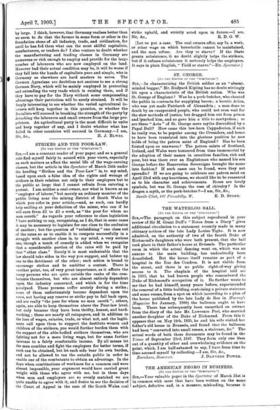STRIKES AND THE POOR-LAW.
[TO THE EDITOR OF THE "SPECTATOR."] SIR, —I am a constant reader of your paper, and as a general rule find myself fairly in accord with your views, especially on such matters as affect the social life of the wage-earning classes, but the article in the Spectator of March 24th under the heading " Strikes and the Poor-Law " is, to my mind, based upon such a false idea of the rights and wrongs of strikers in their relation not only to their employers but to the public at large that I cannot refrain from entering a protest. I am neither a coal-owner, nor what is known as an "employer of labour," but merely an ordinary member of the public living near the mining district of South Wales to which you refer in your article,—and, as such, can hardly help smiling at your definition of the miner, who can if he will earn from £2 to £3 a week, as "the poor for whom no man careth." As regards your reference to class legislation T have nothing to say, recognising, as I do, that in some cases it may be necessary to legislate for one class to the exclusion of another ; but the question of " subsidising " one class out of the rates so as to enable it to compete successfully in a struggle with another class is, to my mind, a very serious one, though a touch of comedy is added when we recognise that a considerable portion of the rates will be paid by that " other class." Surely it is moat undesirable that the law should take sides in the way you suggest, and bolster up one to the detriment of the other; such action is bound to encourage strikes and to embitter a contest. There is another point, too, of very great importance, as it affects the many persons who are quite outside the ranks of the com- batants themselves, but who are almost entirely dependent upon the industry concerned, and which is for the time paralysed. These persons suffer acutely during a strike ; some of them unfortunately become dependent upon the rates, not having any reserve or strike pay to fall back upon, and are really "the poor for whom no man careth "; others, again, are able to keep themselves above the Poor-law level, bat only because they have been thrifty, honest, and hard- working ; these are nearly all ratepayers, and in addition to the loss of wages, salaries, trade, or what not, and the legiti- mate call upon them to support the destitute women and children of the strikers, you would further burden them with the support of the able-bodied strikers themselves, who are lighting not for a mere living wage, but for some further increase to a fairly comfortable income. By all means let the men combine and fight the employers for better terms, if such can be obtained, but let each side bear its own burden, and not be allowed to tax the outside public in order to enable one of the combatants to obtain an advantage. In the days when combinations of workmen for a common end were almost impossible, your argument would have carried great weight with those who agree with me, but in these days when men and employers are so evenly matched we are quite unable to agree with it, and desire to see the decision of the Court of Appeal in the case of the South Wales coal
strike upheld, and strictly acted upon in future.—I am, [Let us put a ease. The coal owners offer, say 7s. a week, or other wage on which households cannot be maintained, and the men refuse. Are they to starve P If the State grants subsistence, it no doubt slightly helps the strikers, but if it refuses subsistence it seriously helps the employers. It says in plain English, " Yield or starve."—En. Spectator.]






































 Previous page
Previous page